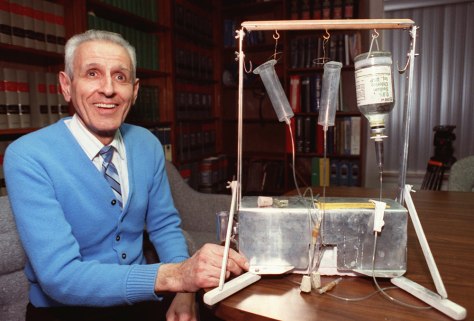The idea seemed so foreign that a physician would help a person die or aid the dying.
The Senate Judiciary Committee in Hartford is now considering a bill that authorizes aid in dying and will hold a public hearing in the coming weeks.
I have been thinking about this and these articles have been part of my reading:
http://www.theguardian.com/commentisfree/2014/jul/12/desmond-tutu-in-favour-of-assisted-dying
Desmond Tutu: a dignified death is our right – I am in favour of assisted dying. The manner of Nelson Mandela's prolonged death was an affront. I have spent my life working for dignity for the living. Now I wish to apply my mind to the issue of dignity for the dying
http://www.thedailybeast.com/articles/2014/10/12/on-her-own-terms-why-brittany-maynard-has-chosen-to-die.html
Gene Robinson: On Her Own Terms: Why Brittany Maynard Has Chosen to Die - The athletic 29-year-old got a Stage 4 brain cancer diagnosis. So rather than lose her dignity, she’s ending her life. On November 1.www.nytimes.com/2015/02/19/opinion/oliver-sacks-on-learning-he-has-terminal-cancer.html
A MONTH ago, I felt that I was in good health, even robust health. At 81, I still swim a mile a day. But my luck has run out — a few weeks ago I learned that I have multiple metastases in the liver. Nine years ago it was discovered that I had a rare tumor of the eye, an ocular melanoma. Although the radiation and lasering to remove the tumor ultimately left me blind in that eye, only in very rare cases do such tumors metastasize. I am among the unlucky 2 percent.
I feel grateful that I have been granted nine years of good health and productivity since the original diagnosis, but now I am face to face with dying. The cancer occupies a third of my liver, and though its advance may be slowed, this particular sort of cancer cannot be halted.
I have been increasingly conscious, for the last 10 years or so, of deaths among my contemporaries. My generation is on the way out, and each death I have felt as an abruption, a tearing away of part of myself. There will be no one like us when we are gone, but then there is no one like anyone else, ever. When people die, they cannot be replaced. They leave holes that cannot be filled, for it is the fate — the genetic and neural fate — of every human being to be a unique individual, to find his own path, to live his own life, to die his own death.www.nytimes.com/2013/11/20/your-money/how-doctors-die.html
BRAVE. You hear that word a lot when people are sick. It’s all about the fight, the survival instinct, the courage. But when Dr. Elizabeth D. McKinley’s family and friends talk about bravery, it is not so much about the way Dr. McKinley, a 53-year-old internist from Cleveland, battled breast cancer for 17 years. It is about the courage she has shown in doing something so few of us are able to do: stop fighting.http://www.zocalopublicsquare.org/2011/11/30/how-doctors-die/ideas/nexus/
This spring, after Dr. McKinley’s cancer found its way into her liver and lungs and the tissue surrounding her brain, she was told she had two options.
“You can put chemotherapy directly into your brain, or total brain radiation,” she recalled recently from her home in suburban Cleveland. “I’m looking at these drugs head-on and either one would change me significantly. I didn’t want that.” She also did not want to endure the side effects of radiation.
What Dr. McKinley wanted was time with her husband, a radiologist, and their two college-age children, and another summer to soak her feet in the Atlantic Ocean. But most of all, she wanted “a little more time being me and not being somebody else.” So, she turned down more treatment and began hospice care, the point at which the medical fight to extend life gives way to creating the best quality of life for the time that is left.
Years ago, Charlie, a highly respected orthopedist and a mentor of mine, found a lump in his stomach. He had a surgeon explore the area, and the diagnosis was pancreatic cancer. This surgeon was one of the best in the country. He had even invented a new procedure for this exact cancer that could triple a patient’s five-year-survival odds–from 5 percent to 15 percent–albeit with a poor quality of life. Charlie was uninterested. He went home the next day, closed his practice, and never set foot in a hospital again. He focused on spending time with family and feeling as good as possible. Several months later, he died at home. He got no chemotherapy, radiation, or surgical treatment. Medicare didn’t spend much on him.http://newoldage.blogs.nytimes.com/2011/12/30/when-doctors-face-death/
It’s not a frequent topic of discussion, but doctors die, too. And they don’t die like the rest of us. What’s unusual about them is not how much treatment they get compared to most Americans, but how little. For all the time they spend fending off the deaths of others, they tend to be fairly serene when faced with death themselves. They know exactly what is going to happen, they know the choices, and they generally have access to any sort of medical care they could want. But they go gently.
Of course, doctors don’t want to die; they want to live. But they know enough about modern medicine to know its limits. And they know enough about death to know what all people fear most: dying in pain, and dying alone. They’ve talked about this with their families. They want to be sure, when the time comes, that no heroic measures will happen–that they will never experience, during their last moments on earth, someone breaking their ribs in an attempt to resuscitate them with CPR (that’s what happens if CPR is done right).
Supplemental...
http://www.courant.com/politics/hc-catholic-church-right-to-die-20150220-story.html
http://www.washingtonpost.com/local/npr-host-diane-rehm-emerges-as-a-key-force-in-the-right-to-die-debate/2015/02/14/12b72230-ad50-11e4-9c91-e9d2f9fde644_story.html

No comments:
Post a Comment